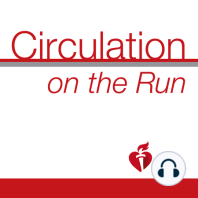17 min listen
Circulation October 2019 Issue
ratings:
Length:
25 minutes
Released:
Oct 7, 2019
Format:
Podcast episode
Description
Dr James de Lemos: My name is James de Lemos. I'm the executive editor for Circulation and I'll be filling in today for Carolyn Lam and Greg Hundley, and delighted to host the podcast for the annual cardiac surgery themed issue. I'm joined today by Tim Gardner from the University of Pennsylvania who leads the surgical content in Circulation year-round, as well as by Dr Marc Ruel, who's the guest editor for this issue and the Chief of Cardiac Surgery at the University of Ottawa and has really led the development of this issue. Marc, Tim, welcome. Dr Timothy Gardner: Thank you. Dr Marc Ruel: Thank you. Good afternoon. Dr James de Lemos: And Marc, thanks for all you've done to bring this issue home again this year. It's really wonderful to see this thing develop. Why don't you start us off and tell us how this issue came together and what the purpose of this is? Why do we publish a specific issue focused on cardiac surgery? Dr Marc Ruel: We're really delighted that Circulation has taken the stance as the cardiovascular community's premier cardiovascular journal. I think as an important piece of this is the fact that cardiovascular surgery already has a resurgence intermediate with importance despite new percutaneous options and medical therapies available. There's more and more patients who find himself in need advance path if you will, of an advanced cardiovascular disease and surgery can be performed with safer and better outcomes constantly. So, I think this issue obviously aims to gather the very best of cardiovascular surgery, not only including cardiac surgery, but also there's actually one of the papers on peripheral vascular surgery. Dr James de Lemos: We'll start Tim with you if you don't mind. I'd like to talk about two papers. One from Stanford that focuses on inter-facility transfer of Medicare patients with Type A dissection and then a research letter that studies hospital volume effects with abdominal aortic aneurysm surgery from Salvatore Scali and colleagues at the University of Florida. Can you walk our readers through these papers and lead the discussion on these? Dr Timothy Gardner: The first paper focused on inter-facility transfer of Medicare recipients with Type A dissections. First off, underlines the fact that this is a very difficult, serious condition with mortality rates in this series there ranging between about 22 and 30%. And the purpose of the study was to analyze how these Medicare patients with acute aortic Type A aortic dissections are managed and whether the effect of high or low volume hospital experiences influences the mortality. As I think we might expect, patients who receive care at high volume aortic surgery centers have a lower mortality. Then the question is, what is the effect of transfer from a low volume or from a hospital without aortic surgery capabilities? What is the net effect there? The benefit of care and a high volume hospital is pretty clear. The mortality rate is significantly lower and the need to transfer or the actual fact of transfer does not increase the risk to the patient. It's an interesting challenge because we do know that patients with acute aortic dissection, if their repair or surgery is delayed, we'll have a predictable accumulating mortality. However, what this study shows is that the benefit of transfer and the importance of experience with this complicated aortic surgery. And it really brings up this very challenging issue of regionalization, of acute care or specialized care. We really struggle with this in so many aspects of surgical care, medical care in general, but especially procedural care. We realize that we need to be able to provide emergency care in many areas and we don't want to suggest that that smaller hospitals may not be able to
Released:
Oct 7, 2019
Format:
Podcast episode
Titles in the series (100)
Circulation January 24, 2017 Issue: Circulation Weekly: Your Weekly Summary & Backstage Pass To The Journal by Circulation on the Run
